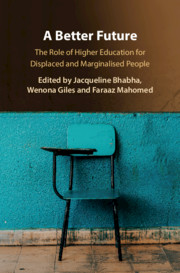Book contents
- A Better Future
- A Better Future
- Copyright page
- Contents
- Figures
- Tables
- Notes on Contributors
- Introduction
- Part I Encountering Marginalisation
- Part II Deconstructing Marginalisation
- Part III Confronting Marginalisation
- Chapter 14 ‘Now I Constantly Challenge Society by Bringing My Existence Forward’
- Chapter 15 Towards an Emergent Theory of Fallism (and the Fall of the White-Liberal-University in South Africa)
- Chapter 16 Family Sacrifice, Faltering Systems
- Chapter 17 DACAmented
- Chapter 18 Building Ethical Relationships through the Borderless Higher Education for Refugees Project in Dadaab, Kenya
- Chapter 19 The ‘Jungle’ Is Here; The Jungle Is Outside
- Chapter 20 Culture, Gender and Technology
- Index
- References
Chapter 16 - Family Sacrifice, Faltering Systems
The Case of First-Generation College Students in Rajasthan
from Part III - Confronting Marginalisation
Published online by Cambridge University Press: 06 September 2020
- A Better Future
- A Better Future
- Copyright page
- Contents
- Figures
- Tables
- Notes on Contributors
- Introduction
- Part I Encountering Marginalisation
- Part II Deconstructing Marginalisation
- Part III Confronting Marginalisation
- Chapter 14 ‘Now I Constantly Challenge Society by Bringing My Existence Forward’
- Chapter 15 Towards an Emergent Theory of Fallism (and the Fall of the White-Liberal-University in South Africa)
- Chapter 16 Family Sacrifice, Faltering Systems
- Chapter 17 DACAmented
- Chapter 18 Building Ethical Relationships through the Borderless Higher Education for Refugees Project in Dadaab, Kenya
- Chapter 19 The ‘Jungle’ Is Here; The Jungle Is Outside
- Chapter 20 Culture, Gender and Technology
- Index
- References
Summary
This chapter summarises the findings of a mixed methods research project carried out with 639 young women from across Rajasthan, India, in 2014. We examine the experiences of young women who progressed to tertiary level education despite having parents with little or no formal education. We classify this cohort as the ‘College’ group. We compare their experiences with other girls, matched by age, location and parental education level, who dropped out during lower secondary school. We identify the triggers of educational success, paying particular attention to how the two groups differ in individual and family characteristics. The College group reported higher perceived levels of emotional support from one or both parents, more flexible familial attitudes towards marriage arrangements, as well as some reductions in expectations for household work. In addition, the College group were more than two times less likely to have grandparents or extended family that strongly disapproved of their continuing education than their non-College counterparts. Despite parental engagement, the College group reported experiencing acute financial strain and difficulties navigating the educational system in areas such as institution and subject choice. These challenges were exacerbated by a lack of formal institutional supports for these first-generation learners.
Keywords
- Type
- Chapter
- Information
- A Better FutureThe Role of Higher Education for Displaced and Marginalised People, pp. 363 - 387Publisher: Cambridge University PressPrint publication year: 2020
References
- 1
- Cited by

